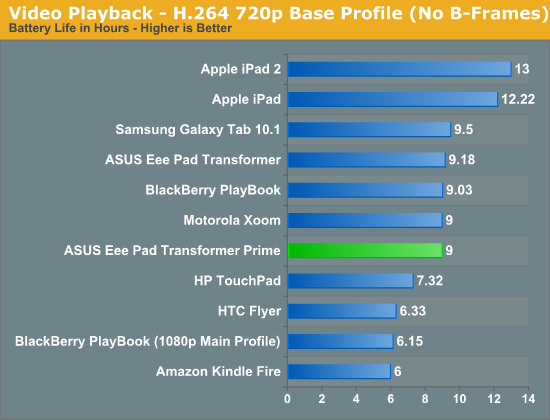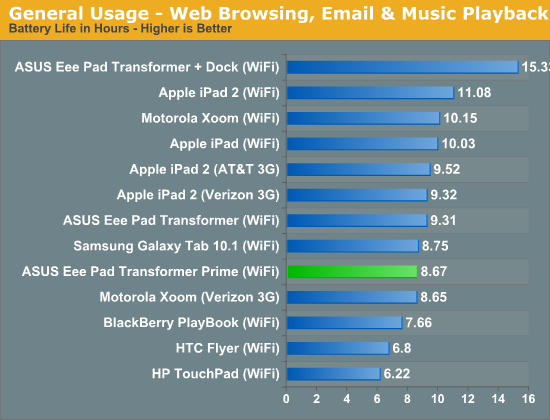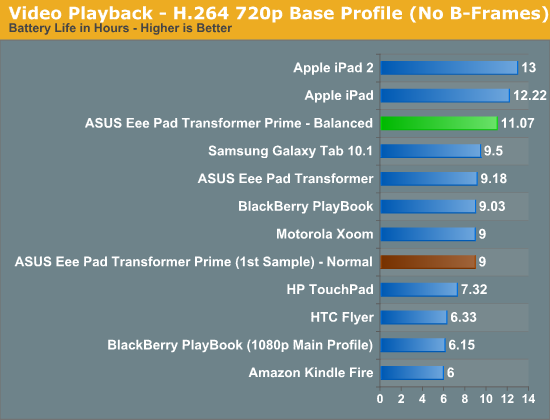ASUS Eee Pad Transformer Prime & NVIDIA Tegra 3 Review
by Anand Lal Shimpi on December 1, 2011 1:00 AM ESTBattery Life
With 39 hours to test I was pretty limited in what I could do when it came to battery life testing. I was able to run through two tests (one run a piece) and only in one configuration each. I wanted to see how Tegra 3 and the Prime fared in the worst case scenario so I picked the Normal power profile. Over the coming days I'll look at battery life in the other two profiles as well, not to mention run through more iterations of our test suite.
My bigger concern has to do with the malfunctioning WiFi in my review unit. For our video playback battery life test WiFi was on but not actively being used, those numbers should be ok. It's our general use test that loads web pages and downloads emails over WiFi and it's there that I believe things could've suffered a bit.
In both cases I saw around 9 hours of continuous battery life out of the Transformer Prime, without its dock. These numbers are a bit lower than the original Transformer but it's unclear to me how much of this is due to the additional cores/frequency or the misbehaving WiFi. The fact that we're within striking range of the original Transformer with the Prime running in Normal mode tells me that it's possible to actually exceed the Transformer's battery life with the Balanced or Power Saver profiles. That's very impressive for an SoC built on the same manufacturing process as its predecessor but with twice the CPU cores and a beefier GPU.


What I'm not seeing however is the impressive gains in battery life NVIDIA promised its companion core would deliver. I'm not saying that the companion core doesn't deliver a tangible improvement in battery life, I'm just saying that I need more time to know for sure.
That the Transformer Prime can deliver roughly the same battery life as its predecessor without any power profile tweaking may be good enough for many users. Both ASUS and NVIDIA shared their own numbers which peg the Prime's battery life in the 10 - 13 hour range. As I mentioned before, I'll have more data in the coming days.
Update - With a replacement Transformer Prime in house, battery life is looking a lot better already:

Update 2: Even more battery life results in our follow-up.










204 Comments
View All Comments
MiSoFine - Thursday, December 1, 2011 - link
my 2 cents...get a Kindle fire. Easier UI for non tech parents & it's still android; cheaper also. Or a Vizio vTab.I got my Mom a Kindle Fire, kids a vTab (they will at least attempt to try to figure it out) & myself a (preordered) Prime.
steven75 - Saturday, December 3, 2011 - link
Considering the complete lack of Android tablet apps, that doesn't seem wise.Enkur - Thursday, December 1, 2011 - link
What is that android app that shows the per core CPU activity in the screenshot above?Lucian Armasu - Thursday, December 1, 2011 - link
Anand, just remember to note, or even test the real world performance when iPad 3 and other high resolution tablets arrive.In your benchmarks they should be showing even faster performance at 720p with the upcoming faster chips, but that might not be the case in the real world. Remember how low FPS the iPhone 4 got with its 4x the resolution over iPhone 3GS, when tested at native resolution?
That should be happening to iPad 3 and the others, too, even if the chips get faster by then. I would wait until at least 2013 to get a 2k resolution tablet, so I won't be that significantly impacted by it.
Lucian Armasu - Thursday, December 1, 2011 - link
Also is there a way to compare the graphics between Tegra 3 and iPad 2 without comparing the benchmark numbers? Like comparing the best graphics on Tegra 3 versus the best one on iPad 2, and notice the differences between them? I really don't think the benchmark numbers tell the whole truth.I think Tegra 3 games may even look/work better than A5 games, thanks to its quad core CPU, too, but I figure you should be able to tell that better than me since you have both.
vision33r - Thursday, December 1, 2011 - link
I disagree, in PC and Console world, the GPU is the determining factor in game graphics and performance.You can take a Core i7 using HD3000 integrated graphics and compare it with a Core i3 with an ATI 4850 and it will spank the Core i7 in gaming performance.
That's what's happening here is the Tegra 3's GPU is underwhelming from a graphics chip maker.
Very few mobile games imo need even dual core, they need the proper graphics acceleration and that's where Android fragmentation has hurt game development.
They have to code games for the lowest common denominator instead of optimizing games for Tegra.
metafor - Thursday, December 1, 2011 - link
That doesn't necessarily translate to the mobile world. On the desktop side, CPU's have gotten so fast that just about any task a game can throw at it -- physics, AI, audio, etc. -- can be done without bottlenecking the game while the shading/rendering on the GPU is still being pushed.On the mobile side, this may not be true (yet) as the CPU's are -- comparatively -- fairly underpowered against their desktop counterparts. Couple this with the fact that the GPU is taxed to push out less pixels and one could easily see situations where the CPU becomes the bottleneck.
As mobile CPU's get faster -- especially with the A15/Krait generation -- this will become less and less of an issue especially as games make use of NEON to do their computationally heavy tasks and we'll get to a point where the GPU is the only bottleneck left.
But I don't see that happening until we hit the ~2.5GHz dual A15/Krait level.
vision33r - Thursday, December 1, 2011 - link
Very few Android games that I've seen are properly optimized unless they got that Optimized for Tegra logo. Otherwise most games do not take advantage of GPU acceleration.On iOS almost all games has some sort of GPU assist. Take Plants vs Zombies, the iOS version is perfect. The Android HD version has lower animation and graphics.
Almost all Gameloft games perform smoother on iOS than on Android.
metafor - Thursday, December 1, 2011 - link
Well yes. But the point is that with a higher performance CPU or group of CPU's, it is possible to have things that would be bottlenecked in a mobile device -- such as physics, AI, etc. -- be more complex and provide better visuals.Whether or not that has been done is another story. But you can hardly blame application devs for pouring more focus into iOS. The iPad is still what, ~90% of the tablet market? Moreover the App Store brings in way more revenue -- which the developers get a cut of -- than Android Market has thus far.
That will hopefully change over time.
steven75 - Saturday, December 3, 2011 - link
The problem with that theory is iPhones still bring in vastly more revenue for developers than android phones, despite the latter having higher market share.